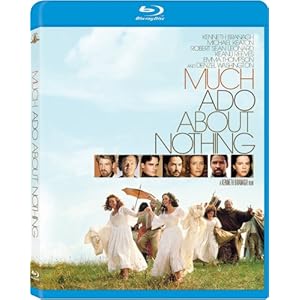

Few films say "exuberance" like Kenneth Branagh's Much Ado About Nothing. The director's high-flying mood could have been ascribed at the time to his seeming storybook marriage with co-star Emma Thompson (they split two years later), but in hindsight it seems more like the pure joy of getting a sizeable budget to romp around a sunny Tuscan resort spouting Shakespeare for a couple of months. For the rest of us, there's the next best thing: Branagh's highly entertaining and accessible take on one of the Bard's zestiest comedies.
With this 1598 play (and the earlier Taming of the Shrew), Shakespeare may well have invented the archetype of the love-hate lovers, a model that saw a resurgence in '30s and '40s screwball comedies (It Happened One Night, His Girl Friday) and in network TV of the '80s (Cheers, Moonlighting). The comic battle of the sexes (or what Much Ado refers to as "a kind of merry war betwixt Signior Benedick and [Beatrice]") dates back at least to Aristophanes' Lysistrata, but Shakespeare's genius for characterization and zingers arguably makes Much Ado the best of the genre. Soldier Benedick (Branagh) has his pride to think about: though he once had a fling with the sharp-tongued Beatrice (Thompson, flawless), their relationship now amounts to regular wars of words. As Benedick's young compatriot Claudio (Robert Sean Leonard) readies for marriage to the equally callow Hero (Kate Beckinsale)—daughter of Messina's governor Leonato (Richard Briers)—Benedick's commander Don Pedro (Denzel Washington) gleefully contrives to trick Beatrice and Benedick into falling in love.
More serious intrigue arises in the Iago-like trickery of Don Pedro's bastard brother Don John (a seriously outclassed Keanu Reeves, bless him), who conspires to forestall Claudio and Hero's marriage by spreading jealousy-inflaming gossip (or "noting," a pun embedded in the title). Rounding out the cast are Imelda Staunton, Brian Blessed, Thompson's mother Phyllida Law, Ben Elton, and Michael Keaton, going for broke in humorously befouling the tricky clown role of malaprop-prone constable Dogberry (though I never cottoned to Branagh ripping off—I know, homaging—the horse-riding shtick from Monty Python and the Holy Grail). The director's concept here is shamelessly to emphasize sun and sex, a wise way to revive Shakespeare's popular appeal. Branagh's own scenery-chewing performance is something of a metaphor for the full-bore approach: entertainingly over the top. Like great live theater, Much Ado About Nothing sends its audience out with an ear-to-ear smile.

|
|
 |
MGM gives Much Ado About Nothing a merry upgrade to high-def in its Blu-ray debut. In a happy surprise, the transfer pushes past mild edge enhancement to deliver palpable hi-def detail and texture, along with contrast and black level that contribute to a nice sense of depth; with pleasing color and a generally clean, solid presentation, there's good reason for owners of the lackluster DVD to trade up. Contrary to the packaging, the disc features a DTS 2.0 soundtrack; though it's not the 5.1 surround mix the case promises, it's clean and adequate to the film's demands, and Patrick Doyle's bold score comes through undimmed.
As on DVD, the bonus features are disappointingly slim: the vintage featurette "Making Ado About Nothing" (6:05, SD) gives a bit of set footage and some interview clips with Branagh and his cast, and we get the "Theatrical Trailer" (2:29, HD). Still, Shakespeare (and Branagh) fans will want to have this classic in hi-def Blu-ray.
 |